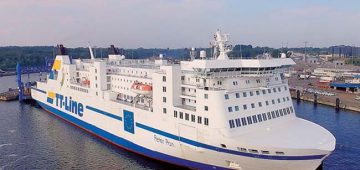The recent fire onboard the container ship Maersk Honam has brought the dangers of fire at sea into the spotlight.
A subsequent report by Norwegian company Gard who are the largest Protection & Indemnity insurer among the thirteen members of the International Group of P&I Clubs, and ranks second in the marine insurance industry behind Allianz makes interesting reading.

They claim that the most common cause of fire in a container ship is misdeclaration of cargo. Gard have been involved in thirteen claims resulting from container ship fires in the past three years and they reckon that twelve of these have been as a result of cargo being misdeclared. Six cases involved calcium hypochlorite variously misdeclared as “organic surface”, “calcium chloride”, “disinfectant” and “whitening agent”. Although a very common chemical product used for water purification, calcium hypochlorite can be very hazardous because it naturally decomposes and emits heat during decomposition. If that process is accelerated by poor packaging or stuffing that does not allow heat to escape, or from external heat sources, the rate of decomposition increases and if this becomes violent an explosion can occur.
There are 451 ultra-large containerships over 10,000 TEU operating today, with another 129 on order for delivery into 2020. A global consultancy firm recently predicted a 50,000 TEU ship by 2067 and global thirst for everyday products is relentless. OECD figures have estimated one billion TEU in transit by 2030, with Asia leading the increase in volume. Today over 400 million lithium ion batteries and over 15 billion aerosols are said to be produced annually. All these staggering numbers suggest that the future container fire risk may be worse than it is today.

Gard states that tackling cargo misdeclaration may well be a first line of defence. However, the industry needs to unite to plug the gaps that exist in that line today. On the one hand ships and crews deserve tougher policing of shippers by states. On the other, the desire to avoid carrying unsafe cargo should always be greater than the desire to carry, which makes the checks and balances at the booking stage important. Perhaps Blockchain technology will have a future role to play in product verification, but until then we are bound to see many more misdeclarations and probably therefore container fires.





Comments
Sorry, comments are closed for this item